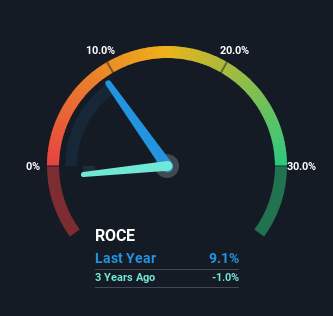- South Korea
- /
- Auto Components
- /
- KOSDAQ:A900260
Investors Will Want Rothwell International's (KOSDAQ:900260) Growth In ROCE To Persist

If we want to find a potential multi-bagger, often there are underlying trends that can provide clues. One common approach is to try and find a company with returns on capital employed (ROCE) that are increasing, in conjunction with a growing amount of capital employed. If you see this, it typically means it's a company with a great business model and plenty of profitable reinvestment opportunities. Speaking of which, we noticed some great changes in Rothwell International's (KOSDAQ:900260) returns on capital, so let's have a look.
Understanding Return On Capital Employed (ROCE)
Just to clarify if you're unsure, ROCE is a metric for evaluating how much pre-tax income (in percentage terms) a company earns on the capital invested in its business. The formula for this calculation on Rothwell International is:
Return on Capital Employed = Earnings Before Interest and Tax (EBIT) ÷ (Total Assets - Current Liabilities)
0.091 = ₩23b ÷ (₩488b - ₩235b) (Based on the trailing twelve months to March 2024).
Therefore, Rothwell International has an ROCE of 9.1%. Even though it's in line with the industry average of 8.5%, it's still a low return by itself.
Check out our latest analysis for Rothwell International

Historical performance is a great place to start when researching a stock so above you can see the gauge for Rothwell International's ROCE against it's prior returns. If you're interested in investigating Rothwell International's past further, check out this free graph covering Rothwell International's past earnings, revenue and cash flow.
What Can We Tell From Rothwell International's ROCE Trend?
Rothwell International is showing promise given that its ROCE is trending up and to the right. Looking at the data, we can see that even though capital employed in the business has remained relatively flat, the ROCE generated has risen by 55% over the last five years. So it's likely that the business is now reaping the full benefits of its past investments, since the capital employed hasn't changed considerably. It's worth looking deeper into this though because while it's great that the business is more efficient, it might also mean that going forward the areas to invest internally for the organic growth are lacking.
On a side note, we noticed that the improvement in ROCE appears to be partly fueled by an increase in current liabilities. The current liabilities has increased to 48% of total assets, so the business is now more funded by the likes of its suppliers or short-term creditors. And with current liabilities at those levels, that's pretty high.
The Bottom Line
To sum it up, Rothwell International is collecting higher returns from the same amount of capital, and that's impressive. However the stock is down a substantial 81% in the last five years so there could be other areas of the business hurting its prospects. In any case, we believe the economic trends of this company are positive and looking into the stock further could prove rewarding.
If you'd like to know about the risks facing Rothwell International, we've discovered 1 warning sign that you should be aware of.
While Rothwell International may not currently earn the highest returns, we've compiled a list of companies that currently earn more than 25% return on equity. Check out this free list here.
New: AI Stock Screener & Alerts
Our new AI Stock Screener scans the market every day to uncover opportunities.
• Dividend Powerhouses (3%+ Yield)
• Undervalued Small Caps with Insider Buying
• High growth Tech and AI Companies
Or build your own from over 50 metrics.
Have feedback on this article? Concerned about the content? Get in touch with us directly. Alternatively, email editorial-team (at) simplywallst.com.
This article by Simply Wall St is general in nature. We provide commentary based on historical data and analyst forecasts only using an unbiased methodology and our articles are not intended to be financial advice. It does not constitute a recommendation to buy or sell any stock, and does not take account of your objectives, or your financial situation. We aim to bring you long-term focused analysis driven by fundamental data. Note that our analysis may not factor in the latest price-sensitive company announcements or qualitative material. Simply Wall St has no position in any stocks mentioned.
Have feedback on this article? Concerned about the content? Get in touch with us directly. Alternatively, email editorial-team@simplywallst.com
About KOSDAQ:A900260
Rothwell International
Engages in the research, development, manufacturing, and sales of automotive electronics and electrical products in South Korea.
Solid track record with excellent balance sheet.


